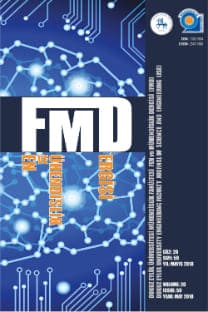İZMİRNET İSTASYONLARINDA STANDART SPEKTRAL ORAN YÖNTEMİ KULLANILARAK ZEMİN TRANSFER FONKSİYONLARININ HESAPLANMASI
Bu çalışmada İzmirNET ivme-ölçer istasyonlarındaki yerel zemin etkileri, standart spektral oran yöntemi (SSR) kullanarak hesaplanmıştır. Her zemin için azimutal dağılımı uygun seçilen altı adet depremin S dalgası seçilmiş ve spektrumu alınmıştır. Bu istasyonlar, daha sonra referans istasyon olarak seçilen MNV istasyonunun spektrumuna oranlanmış ve saptanan depremlere ait spektral oranların geometrik ortalaması istasyon bazında grafiklenmiştir. Zeminlerin özelliklerine göre farklı büyütme değerleri elde edilmiştir ve farklı freakanslara göre haritalanmıştır. Kaya zemin olan Paleosen kireçtaşları, Miosen volkanitleri ve filişlerde büyütme gözlenmemiştir. En büyük büyütme, eski Gediz deltası üzerindeki Mavişehir’de yer alan MVS istasyonunda tespit edilmiştir. Diğer belirgin büyütme pikleri ise Kuvaterner alüvyonda yer alan Karşıyaka, Bostanlı, Balçova ve Konak istasyonlarında gözlenmiştir
Anahtar Kelimeler:
Büyütme, IzmirNET, Zemin etkisi, Standart spektral oran, Kuvvetli yer hareketi ağı
ESTIMATION OF SOIL TRANSFER FUNCTIONS OF IZMIRNET STATIONS USING BY STANDART SPECTRAL RATIO
In this study, local site effects of IzmirNET accelerometric stations have been calculated by using the Standard Spectral Ratio (SSR) method. S-wave of six selected earthquakes have been chosen according to azimuthal distribution for each site and then their spectrums were computed. These stations have been divided by the reference station which was chosen as MNV and then, geometric mean of spectral ratio of selected events was illustrated as graphic for each station. Different amplifications were obtained regarding the soil characteristics and mapped for different frequencies. No amplifications were observed with respect to rock on Paleocene limestones, Miocene volcanics and flysch. Peak amplification was detected in Mavisehir where old Gediz River bed presents over there. Other remarkable peaks are observed on Quaternary alluvial in Karsiyaka, Bostanli, Balcova and Konak stations
Keywords:
Amplification, IzmirNET, Site effect, Standart spectral ratio, Strong-motion network,
___
- Akgün M. (2012): “Kişisel görüşme (16.07.2012)”, Dokuz Eylül Üniversitesi Jeofizik Müh. Bölümü, Tınaztepe Kampüsü, İzmir.
- Borcherdt R. D. (1970): “Effects of Local Geology on Ground Motions Near San Francisco Bay”, Bull. Seism. Soc. Am. Sayı 60, s.29-61.
- Dbybhy (2007): “Deprem bölgelerinde yapılacak binalar hakkında esaslar (EK)”, Türkiye Deprem Yönetmeliği, Ankara, ss.159.
- Field E. H., Jacob K. H., Hough S. E. (1992):“Earthquake Site Response Estimation: A Weak-motion Case Study”, Bull. Seism. Soc. Am. Sayı 82, s.2283-2307.
- Gök E. (2011): “Investigation of Earthquake Hazard ve Seismic Site Characteristic in the Examples of Bursa ve Izmir”, Doktora Tezi (ingilizce), Dokuz Eylül Üniversitesi Fen Bilimleri Enstitüsü, İzmir, s.170.
- Gök E. Polat O. (2012): “Microtremor HVSR Study of Site Effects in Bursa City (Northern Marmara Region, Turkey”, Earthquake Research and Analysis-New frontiers in Seismology, Sebastiano D'Amico (Ed.), ISBN: 978-953-307-840-3, InTech.
- Konno K., Ohmachi T. (1998): “Ground-motion Characteristics Estimated from Spectral Ratio between Horizontal and Vertical Components of Microtremor”, Bulletin Seismological Society of America, Sayı 88, s.228–241.
- Lermo J., Chavez G. F. J. (1993): “Site Effect Evaluation Using Spectral Ratios with Only One Station”, Bulletin Seismological Society of America, Sayı 83, s.1574–1594.
- Polat O., Çeken U., Uran T., Gök E., Yılmaz N., Beyhan M., Koç N., Arslan B., Yılmaz D., Utku M. (2009): “ IzmirNet: A Strong-Motion Network in Metropolitan Izmir, Western Anatolia, Turkey”, Seism. Res. Lett. Cilt80, No. 5, s.831-838.
- Sesame (2004): “Guidelines for the Implementation of the H/V Spectral Ratio Technique on Ambient Vibrations: Measurements, Processing and Interpretation”, http://sesame- fp5.obs.ujfgrenoble.fr/Delivrables/Del-D23.
- Sözbilir H., Uzel B., Sümer O., İnci U., Ersoy Y., Koçer T., Demirtaş R., Özkaymak C. (2008): “Evidence for a Kinematically linked E-W Trending Izmir Fault and NE-trending Seferihisar Fault: Kinematic and Paleoseismogical Studies Carried out on Active Faults forming the Izmir Bay, Western Anatolia”, Geological Bulletin of Turkey, Cilt 51, No. 2, s.91-114 (in Turkish with English abstract).
- Sözbilir H., Sarı B., Uzel B., Sümer O., Akkiraz S. (2010): “Tectonic Implications of Transtensional Supradetachment Basin Development in an Extension-parallel Transfer Zone: the Kocacay Basin, Western Anatolia, Turkey”, Basin Research doi: 10.1111/j.1365-2117.2010.00496.x. Sayfa No: 11
- Steidl J. H., Tumarkin A. G., Archuleta R. J. (1996): “What is a reference site?”, Bull Seism. Soc. Am., Cilt 86, s.1733-1748.
- Uzel B., Sözbilir H., Özkaymak C. (2010): “Neotectonic Evolution of an Actively Growing Superimposed Basin in Western Anatolia: The Inner Bay of Izmir, Turkey”, Turkish J. Earth Sci., doi: 10.3906/yer.0910.11.
- Yalçınkaya E., Alptekin Ö. (2005): “Site Effect and its Relationship to the Intensity and Damage Observed in the June 27, 1998 Adana-Ceyhan Earthquake”, Pure Appl. Geophys,. Cilt 162, s.913–930.
- Rodriguez M. A., Bray J. D., Abrahamson N. A. (2001): “An Empricial Geotechnical Seismic Site Response Procedure”, Earthq. Spec., Cilt 17, No. 1, s.65-87.
- Zhao J. X., Irikura K., Zhang J., Fukushima Y., Somerville P. G., Asano A., Ohno Y., Oouchi T., Takahashi T., Ogawa H. (2006): “An Empirical Site-Classification Method for Strong- Motion Stations in Japan Using H/V Response Spectral Ratio”, Bull. Seism. Soc. Am., Cilt 96, No.3, s.914-925.
- ISSN: 1302-9304
- Yayın Aralığı: Yılda 3 Sayı
- Başlangıç: 1999
- Yayıncı: Dokuz Eylül Üniversitesi Mühendislik Fakültesi
Sayıdaki Diğer Makaleler
Sevgi Tokgöz GÜNEŞ, Cihan GÜNEŞ
HAZAR GÖLÜ CANSUYU VE POMPAJ DEPOLAMALI HES PROJESİ
